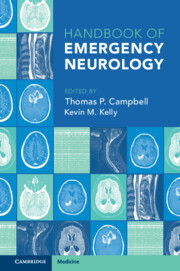Book contents
- Handbook of Emergency Neurology
- Handbook of Emergency Neurology
- Copyright page
- Contents
- Contributors
- Section 1 Neurologic Examination and Neurodiagnostic Testing
- Section 2 Common Neurologic Presentations: A Symptom-Based Approach
- Section 3 Specific Neurological Disorders in Emergency Medicine
- Chapter 11 Ischemic Stroke and Transient Ischemic Attack
- Chapter 12 Intracranial Hemorrhage
- Chapter 13 Seizures
- Chapter 14 Infections of the Central Nervous System
- Chapter 15 Traumatic Brain Injury
- Chapter 16 Increased Intracranial Pressure and Herniation Syndromes
- Chapter 17 Traumatic and Nontraumatic Spinal Cord Disorders
- Chapter 18 Neuro-ophthalmology Emergencies
- Chapter 19 Brain Tumors and Other Neuro-oncologic Emergencies
- Chapter 20 Peripheral Nerve and Neuromuscular Disorders
- Chapter 21 Movement Disorders
- Chapter 22 Multiple Sclerosis
- Chapter 23 Hydrocephalus and Shunt Evaluation
- Chapter 24 Post-Arrest Neurologic Resuscitation
- Chapter 25 Neurotoxicology
- Chapter 26 Neurologic Emergencies of Pregnancy
- Chapter 27 Brain Death
- Chapter 28 Hysteria
- Index
- References
Chapter 15 - Traumatic Brain Injury
from Section 3 - Specific Neurological Disorders in Emergency Medicine
Published online by Cambridge University Press: 10 January 2024
- Handbook of Emergency Neurology
- Handbook of Emergency Neurology
- Copyright page
- Contents
- Contributors
- Section 1 Neurologic Examination and Neurodiagnostic Testing
- Section 2 Common Neurologic Presentations: A Symptom-Based Approach
- Section 3 Specific Neurological Disorders in Emergency Medicine
- Chapter 11 Ischemic Stroke and Transient Ischemic Attack
- Chapter 12 Intracranial Hemorrhage
- Chapter 13 Seizures
- Chapter 14 Infections of the Central Nervous System
- Chapter 15 Traumatic Brain Injury
- Chapter 16 Increased Intracranial Pressure and Herniation Syndromes
- Chapter 17 Traumatic and Nontraumatic Spinal Cord Disorders
- Chapter 18 Neuro-ophthalmology Emergencies
- Chapter 19 Brain Tumors and Other Neuro-oncologic Emergencies
- Chapter 20 Peripheral Nerve and Neuromuscular Disorders
- Chapter 21 Movement Disorders
- Chapter 22 Multiple Sclerosis
- Chapter 23 Hydrocephalus and Shunt Evaluation
- Chapter 24 Post-Arrest Neurologic Resuscitation
- Chapter 25 Neurotoxicology
- Chapter 26 Neurologic Emergencies of Pregnancy
- Chapter 27 Brain Death
- Chapter 28 Hysteria
- Index
- References
Summary
Traumatic brain injury (TBI) is an increasingly common cause of morbidity and mortality in the United States. Rates of emergency department visits for TBI rose 70% between 2001 and 2010, with an estimated 2.5 million patients/year seeking emergency care, highlighting the increased focus on early identification and treatment of brain injuries. Hospital admission rates for TBI rose 11% in this time frame while deaths decreased 7%. Despite improvements in the management of TBI, 50,000 people die each year from this trauma (30% of all trauma related deaths in the United States). Falls are the most common mechanism of TBI, followed by blunt trauma, motor vehicle collisions, and assault. Men are three times more likely to sustain a TBI than their female counterparts, whereas the very young (<4 years old) and older patients (>65 years old) are more likely to sustain head trauma than those of other ages.
Keywords
- Type
- Chapter
- Information
- Handbook of Emergency Neurology , pp. 227 - 234Publisher: Cambridge University PressPrint publication year: 2023

